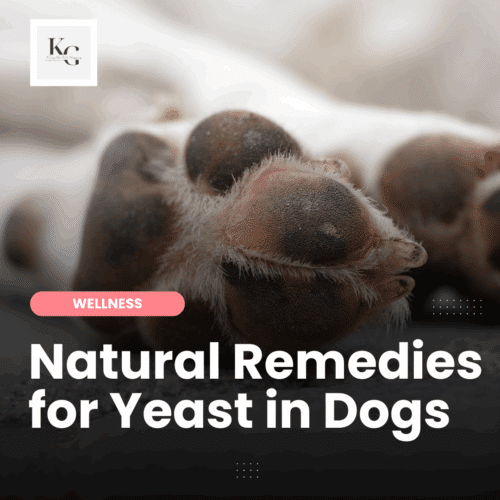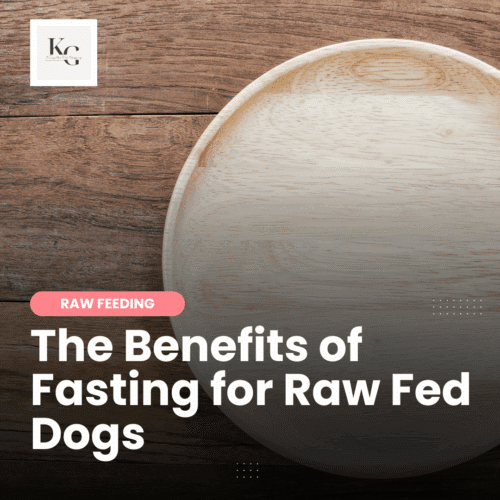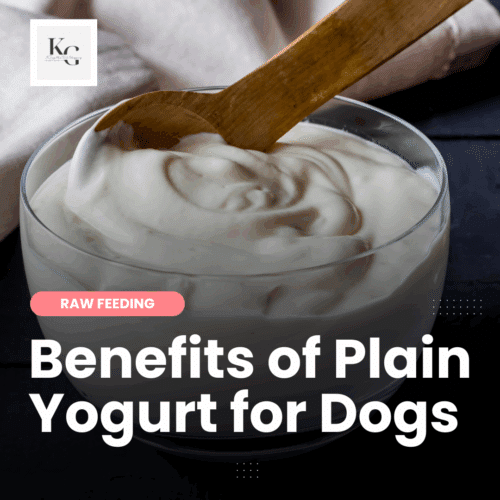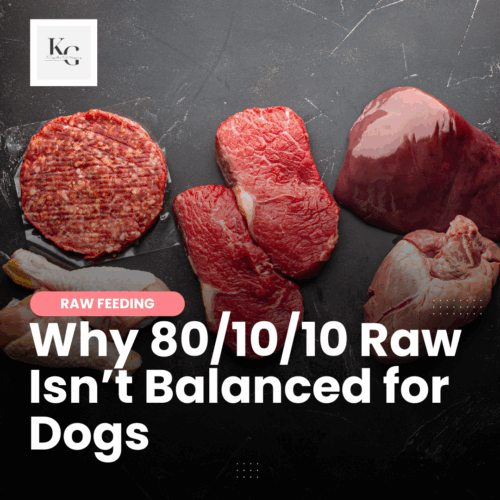Keep the Tail Wagging is supported by pet parents. I occasionally earn a commission (at no additional cost to you) when you click through an affiliate link to one of my favorite products. Thank you for your support. Read More
I transitioned my dogs to a raw food diet in 2013 – 80/10/10 was considered a healthy raw diet back then, but not a balanced diet. As I learned more about canine nutrition and raw feeding, I learned that 80/10/10 is a diet deficient in nutrients like Omega-3 fatty acids, Vitamins E and D, and choline, but this is something I've resolved by alternating protein and other ingredients, and using a base mix. I don't believe I need to stress about feeding a balanced diet to my dogs.
Why We Need to Feed a Balanced Raw Diet
It's easy to convince yourself that balancing a dog's homemade diet isn't necessary (they don't balance diets in the wild), but dogs are domesticated, not wild. When preparing a homemade diet for dogs, it's crucial to meet their nutritional needs to promote a healthy immune system, aid digestion, and ensure peak physical condition.
1 – Balanced Diets for Puppies
Puppies need higher levels of protein to support their growth and development, Omega-3 fatty acids for cognitive/brain development, and proper calcium and phosphorus balance for strong bones and teeth. Feeding a deficient diet can lead to poor growth and skeletal abnormalities.
Here are some key reasons why a balanced diet is crucial for puppies:
- Nutrient Requirements: Puppies have specific nutrient requirements that support rapid growth and development. A balanced diet ensures they receive enough protein, carbohydrates, fats, vitamins, and minerals for optimal health.
- Bone and Muscle Development: Growing puppies need adequate protein and minerals like calcium and phosphorus to support healthy bone and muscle development. A balanced diet provides these essential nutrients in the proper proportions.
- Immune System Support: Proper nutrition is vital for a puppy's immune system to function optimally. Nutrients like vitamin E, vitamin C, and zinc help support a strong immune response to fight off infections and diseases.
- Digestive Health: A balanced diet with sufficient fiber and probiotics promotes a healthy gut microbiome, aiding digestion and nutrient absorption in puppies. This helps prevent digestive issues and supports overall gastrointestinal health.
- Brain Development: Essential fatty acids such as DHA (docosahexaenoic acid) are essential for brain development and cognitive function in puppies. A balanced diet rich in these nutrients can support proper brain growth and function.
Feeding puppies a balanced diet tailored to their specific needs is essential for setting a strong foundation for a lifetime of health and well-being.
2 – Balanced Diets for Senior Dogs
Senior dogs may experience decreased nutrient absorption or require additional support for cognitive health, liver and kidneys, joints, and more. As dogs age, their nutritional needs change, and a balanced diet tailored to senior dogs can address specific issues related to aging.
Here are some key reasons why a balanced diet is important for senior dogs:
- Weight Management: Senior dogs are often less active and have a slower metabolism, making them more prone to weight gain. A balanced diet with appropriate calorie levels and nutrient density can help prevent obesity and maintain a healthy weight, reducing strain on aging joints and organs.
- Joint Health: Many senior dogs experience joint issues such as arthritis or stiffness. A balanced diet rich in omega-3 fatty acids, glucosamine, and chondroitin can help support joint health, reduce inflammation, and improve mobility.
- Digestive Health: Aging can impact a dog's digestive system, leading to issues like decreased nutrient absorption or gastrointestinal sensitivities. A balanced diet with easily digestible proteins, fiber, and prebiotics can support digestive health and nutrient absorption in senior dogs.
- Heart Health: Senior dogs may be more prone to heart conditions as they age. A balanced diet low in sodium and rich in antioxidants, omega-3 fatty acids, and L-carnitine can support cardiovascular health and reduce the risk of heart disease.
- Brain Function: Cognitive decline is common in aging dogs. A balanced diet containing antioxidants, vitamins E and C, and fatty acids like DHA can support brain health, cognitive function, and memory in senior dogs.
Feeding senior dogs a balanced diet that meets their changing nutritional needs is essential for promoting longevity, managing age-related health issues, and ensuring continued good quality of life.
3 – Balanced Diets for Adult Dogs
When it comes to balance, people seem to be most concerned about puppies and senior dogs. But we shouldn't neglect our adult dogs. All dogs, regardless of age, require a wide range of nutrients, including proteins, fats, vitamins, and minerals, to support their growth, development, energy needs, immune function, organ health, and overall health, which can be provided through a balanced diet.
Why I Don't Stress About Balance
Although I now agree that feeding a diet that meets a dog's nutritional needs is important, I'm not losing sleep because I disagree with the growing number of people turning raw feeding into a science project that only a few can complete.
1 – Every Dog is Different
The idea that there is one diet that can meet the nutritional needs of all dogs doesn't make sense to me. Every dog is unique, which extends to their nutritional needs. I don't believe the NRC guide, FEDIEF, or AAFCO can tell us definitively what our dogs need, but these are a start and the best we have at the moment. I use Animal Diet Formulator software to confirm that I'm on the right track and continue to learn about building raw meals for my dogs – but that's it. The idea that I need to create an exact combination of macro and micronutrients to feed my dogs doesn't ring accurate or feasible.
2 – Animals (including Humans) Balance Over Time
Except for puppies, I believe in balancing over time. If we're taking inspiration from wild dogs and wolves, shouldn't we incorporate foraging when feeding our dogs? I do this by providing different foods every day, switching up the primary protein weekly, feeding meals of raw meaty bones, and adding a fasting day. I no longer maintain a spreadsheet to confirm that I'm meeting my dogs' nutritional needs.
While alternating ingredients alone may not achieve balance in a diet, I believe that it helps by providing varying levels of nutrients and different types of amino acids, while reducing the chance of a dog developing food sensitivities.
3 – We're Always Learning
I learn something new with every dog that joins our family, every book I read, every conference I attend. Over the past decade, how I feed my dogs has changed many times, because I'm always learning. So, I'm not going to get attached to one method. Instead, I remain openminded, taking in the information being shared by experts and other raw feeders, and taking time to research the information coming my way to determine if it's appropriate for my dogs.
Just because a popular veterinarian or influencer is advocating for or against a raw feeding model or ingredient doesn't mean I have to follow their lead. But it's always nice to learn why people do what they do, because the knowledge may come in handy down the road.
How I Meet My Dogs' Nutritional Needs
While I respect the importance of meeting a dog's nutritional needs, I don't think it's rocket science. When feeding puppies, I want to feed a diet that's balanced daily and not over time. In this case, I have several options:
- commercial raw formulated for all life stages; available at local, independent pet stores.
- work with a canine nutritionist who offers meal formulation services.
- use meal formulation software to create the meals.
For adult and senior dogs:
- I start with a foundation of 80/10/10 and mix in a base mix and canned oysters.
- I add whole foods or supplements to support gut health and the immune system and address individual needs.
- I alternate proteins weekly to balance over time.
My Raw Feeding Priorities
Because I'm using a base mix, balance isn't a priority when I'm feeding my dogs. I'm focused more on their gut health and immune system, supporting their health through food, and letting my dogs be dogs. When it comes to raising healthy dogs, diet is only a piece of the puzzle.
Gut Health and Immune System
80% of the immune system lives in the gut. By promoting a healthy gut microbiome, I also provide my dogs with a robust immune system. I feed a raw diet, fermented foods, vegetables, and natural supplements. One of my favorite products is Gussy's Gut, an organic, freeze-dried, fermented vegetable blend that supports gut health, the immune system, and more.
Supporting Health Through Food
When I can, I reach for whole foods to address health issues. For example, I feed natural fiber (fur and vegetables) to address loose stool, fatty fish to support cognitive health and reduce inflammation, and duck feet and bone broth for joints. This has allowed me to reduce the number of supplements I use, alternating between Gussy's Gut, medicinal mushrooms, and digestive supplements.
Letting My Dogs Be Dogs
And, making sure my dogs get plenty of exercise and engagement is crucial. I try to create daily opportunities for them to be dogs – running around the property, digging in the dirt, eating raw meaty bones outside (or air-dried bones when it's cold), and long sniff walks. These are experiences many of the long-living dogs have in common.
Why Raw Feeders Stress About Balance
I think people stress about balance because they don't want to make a mistake. Although raw feeding is easy, taking on all the responsibility for our dog's nutrition and health in an environment with little veterinarian support is intimidating. It doesn't matter how many raw feeders tell you how easy it is to feed raw. Everyone's experience is different.
I began feeding raw in 2013, and I began DIY raw feeding in 2014. I didn't start educating myself about balance until 2017 when I created a schedule to understand the nutrients various foods provided. In 2019, I began using Animal Diet Formulator software and a base mix by Dr. Harvey's. I didn't technically start feeding a balanced diet (outside of commercial raw) until 2019, six years after I transitioned my dogs to raw.
I don't share this to discourage anyone from seeking balance when feeding raw; I'm sharing this to remind you that it's not rocket science. And, whenever I find myself stressing about raw, I think about the thousands of people who successfully fed their dogs a raw diet before social media introduced the random opinions of strangers into our lives.






